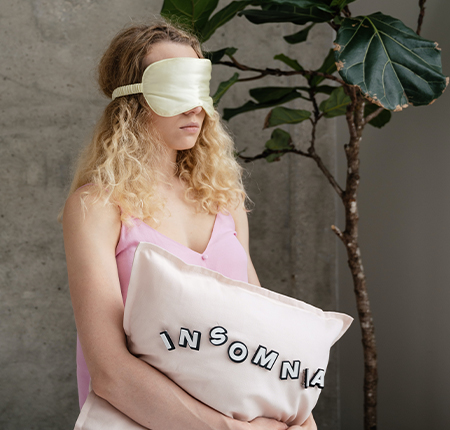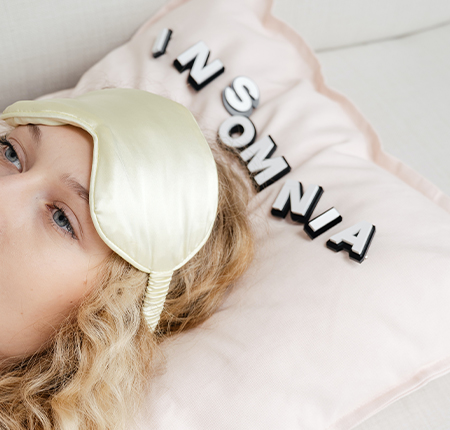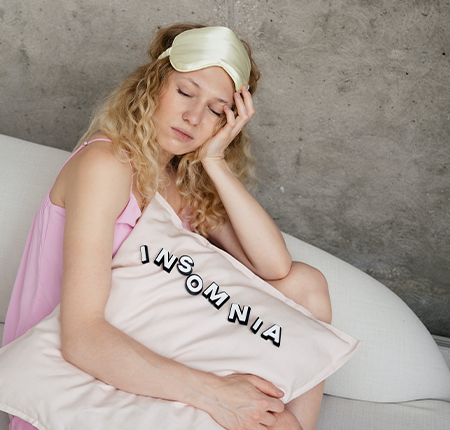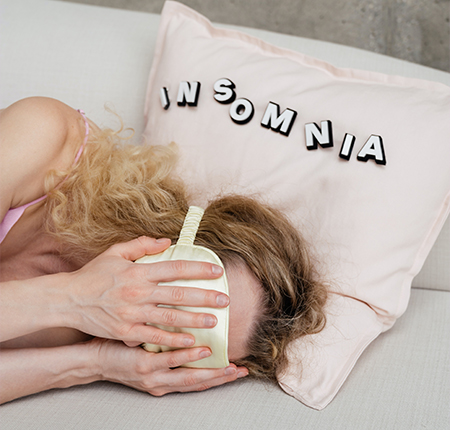
Do you feel exhausted during or just before your period?
You might think the only reasons are cramps and mood swings, but there may be a lot more to it: because sleep and sleep quality around your period—or even before, for those of us with PMS—suffers.
Read the article to find out what could be the causes and how you can sleep better before and during your period!
What is insomnia?
Insomnia is a sleep disorder characterized by difficulty falling asleep and awakenings during the night.
A recent study shows that more than 50% of Romanians sleep less than 7-8 hours a night and over 75% suffer from exhaustion ! When left untreated, insomnia can affect the cardiovascular system and the ability to concentrate.

How do you know you suffer from period insomnia?
The first step is to identify the symptoms:
- You feel increased irritability
- You have a general state of fatigue
- You can't fall asleep
- You wake up several times during the night
- You have restless or restless sleep
- You suffer from heartburn, indigestion or other gastrointestinal problems.
Causes insomnia during menstruation
And yet, what makes you more prone to insomnia before and during your period?
Well, during these days, estrogen and progesterone levels change. For example, progesterone goes down and estrogen goes up - but if you already have a higher level of estrogen in general, a hormonal imbalance will occur, causing those menstrual cramps and more: because this is where insomnia can occur.
As estrogen increases, melatonin production decreases - and that's the hormone that makes you sleepy - but we'll talk more about melatonin later in the article.
And if we're still talking about hormones, the lack of progesterone also contributes to insomnia: progesterone has a sedative effect on the body, and when you're on your period, its level drops.

In short, the causes of insomnia before and during menstruation can be:
Increased level of estrogen
Decreased melatonin production - caused by increased estrogen
The lack of progesterone - even considered a "sleep-inducing" hormone due to its sedative effect - can cause sleep problems.
Anxiety or depression - caused by the sudden drop in progesterone
The stress
Profuse flow during menstruation
A physical or mental condition
Some medicines (antidepressants)
Hyperthyroidism
Caffeine consumption before sleep
Insomnia before menstruation: Premenstrual Syndrome
You may experience PMS every month. In fact, many people have different PMS symptoms, some even flu-like: headaches, nausea and even fever before your period are just some of the symptoms that can make you wonder what's wrong!?
The good news: you are not alone. "
"Menstrual flu" does exist, it's not a myth, and it has nothing to do with the real flu. The bad news? It is still poorly understood by specialists and is not always recognized as a medical condition.
What happens when you don't get enough sleep?
Your memory, ability to concentrate and mental health may be affected. In addition, the risk of prediabetes may increase due to insomnia.
How to sleep better during menstruation
Although the discomfort saps your energy and you can feel overwhelmed by all these symptoms, it's important to take some steps to prevent insomnia and have a more restful sleep, regardless of the phase of your menstrual cycle.

What can you do to sleep better when you suffer from PMS or when you are on your period?
Balanced diet and hydration
It is important to eat foods that restore hormonal balance. When you are faced with a slight imbalance, the first step is to rethink your daily menu. For example, eating flax seeds, nuts and legumes helps stabilize progesterone levels.
Proper hydration is also essential, as it will help flush excess sodium from your body - which causes bloating and water retention during your period - helping you to reduce discomfort and sleep better.
Coffee during menstruation
We know, it seems impossible to give up caffeine (ever!), but if you have insomnia, caffeine can make your sleep disorders worse. Coffee has the power to create a vicious cycle when you don't get enough sleep.
The good thing is that there are healthier alternatives, and during your period it's good to drink green tea - or other low-caffeine drinks.
Micronutrients and food supplements
If you re-read the causes of insomnia during menstruation, you will notice that I also mentioned stress there, and not by chance. Stress has many negative effects on your body, including depleting magnesium. Why is this happening?
By eliminating magnesium, your body helps your nervous system cope with a stressful situation. Normally, when you live a low-stress lifestyle, this is not a problem: your body has time to recover magnesium from your diet (green vegetables, nuts, seeds) after a stressful event.
But for most of us, and especially in the context of stressful events in the modern world, magnesium in food is not enough. Lara Briden, naturopathic doctor and women's health activist, recommends magnesium supplements.
"Micronutrients are vitamins and trace elements that are essential for menstrual health. There are dozens of micronutrients. You need them all, but luckily you don't need to supplement them all. You only need to supplement the ones that are difficult to get from food. Let's start with the one I recommend most: magnesium: the miracle mineral for menstruation." - Lara Briden, Period Repair Manual: Natural Treatment for Better Hormones and Better Periods
Other supplements that can help you are Vitamin B6 - because it favors the production of serotonin and melatonin. Melatonin - as a dietary supplement - helps regulate the circadian rhythm and helps you transition from wakefulness to sleep.
Sleep hygiene
Before supplements, however, you should ask yourself how you are doing with your sleep hygiene and what you can do to improve it? Here are some things to think about:
Temperature: studies show that a lower temperature (around 18-19 degrees C) is optimal for restful sleep
Sleep schedule: it's good to set your wake-up and bedtime times and not oversleep during the day
Evening routine and relaxation before bed: Set aside at least 30 minutes to relax before bed, without the light of an electronic device
Optimizing the bedroom: from mattress, bedding, light, noise - to plants and aromatherapy)
Taking care of yourself during menstruation: menstrual products should not cause hormonal imbalances
I still have insomnia during my period. What else could I do?
If a symptom diary doesn't help you sleep better during your period, it might be worth talking to your GP or gynecologist for advice. Your doctor will know what to recommend, including various treatments such as hormonal birth control.

Have a question about period insomnia? Tell us about your experience and ask us more on insta @enroush . And don't forget that with the ENROUSH subscription you get organic absorbents and tampons at home! Plus, it helps you sleep better knowing you don't have to run every month for menstrual products!






















